I want one dag starts after completion of another dag. one solution is using external sensor function, below you can find my solution. the problem I encounter is that the dependent dag is stuck at poking, I checked this answer and made sure that both of the dags runs on the same schedule, my simplified code is as follows: any help would be appreciated. leader dag:
from airflow import DAG
from airflow.operators.bash_operator import BashOperator
from datetime import datetime, timedelta
default_args = {
'owner': 'airflow',
'depends_on_past': False,
'start_date': datetime(2015, 6, 1),
'retries': 1,
'retry_delay': timedelta(minutes=5),
}
schedule = '* * * * *'
dag = DAG('leader_dag', default_args=default_args,catchup=False,
schedule_interval=schedule)
t1 = BashOperator(
task_id='print_date',
bash_command='date',
dag=dag)
the dependent dag:
from airflow import DAG
from airflow.operators.bash_operator import BashOperator
from datetime import datetime, timedelta
from airflow.operators.sensors import ExternalTaskSensor
default_args = {
'owner': 'airflow',
'depends_on_past': False,
'start_date': datetime(2018, 10, 8),
'retries': 1,
'retry_delay': timedelta(minutes=5),
}
schedule='* * * * *'
dag = DAG('dependent_dag', default_args=default_args, catchup=False,
schedule_interval=schedule)
wait_for_task = ExternalTaskSensor(task_id = 'wait_for_task',
external_dag_id = 'leader_dag', external_task_id='t1', dag=dag)
t1 = BashOperator(
task_id='print_date',
bash_command='date',
dag=dag)
t1.set_upstream(wait_for_task)
the log for dependent dag:

